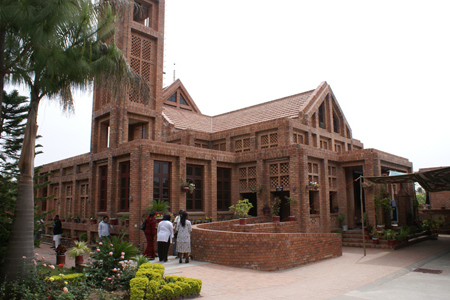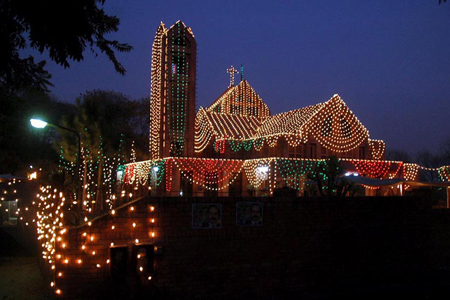| |
 |
 |
 |
| Comment on this report, or find other reports. |
 |
| Our Mystery Worshippers are volunteers who warm church pews for us around the world. If you'd like to become a Mystery Worshipper, start here. |
 |
| Find out how to reproduce this report in your church magazine or website. |
|
|
| 1535: St Thomas,
Islamabad, Pakistan |
 |
 |
 |
Mystery Worshipper:
The Emirati Auntie.
The church:
St Thomas's, Islamabad, Pakistan.
Denomination:
Church of Pakistan. The Church of Pakistan was established
in 1970 as a union of Anglicans, Scottish Presbyterians (Church
of Scotland), Methodists and Lutherans. It is a part of the
Anglican Communion and is loosely affiliated with the Anglican
Diocese of Manchester.
The building:
A warm red coloured brick structure of indeterminable age
– I would guess it dates from the 1980s. The style draws
on surviving traditional Pakistani brickworking skills and
local Moghul architecture. It looks slightly out of place
given the monolithic concrete buildings nearby, most of which
appear to suffer from a lack of care. As might be expected,
there is a high wall surrounding the compound, and armed police
at the gate inspect all visitors' bags, including those of
the congregation. And with good reason – tensions between
Christians and Muslims in the region run high.
The church:
It's pretty special to be an enclave for Christ in a Muslim
country that does not have the same reputation for tolerance
as you might find elsewhere! The congregation tries its best
to carry on with a brave face despite the political undertones
and Pakistan's more recent common identity as a Muslim state.
St Thomas's plays an active part in two important ministries:
the Community Health Network, which provides health care for
approximately 4,000 families; and the Literacy Project, which
educates young children and enables them to pass admission
tests for government schools.
The neighbourhood:
Islamabad, laid out in the 1960s in basically a triangular
shape, is the capital of Pakistan. As a relatively new city,
it boasts wide streets and clearly defined zoning (i.e., distinct
residential, commercial, retail, educational, etc. areas).
The skyline's most prominent feature is the famous King Faisal
mosque, among the largest mosques in the world and a gift
from King Faisal of Saudi Arabia. Incidentally, the mosque
is open to non-Muslims (provided they are suitably dressed,
male or female) and well worth a visit! But westerners should
not make the mistake of thinking this is a completed, shiny,
wow-factor city. State and high profile public buildings may
be striking, even beautiful, and well maintained, but there
are still plenty of ramshackle communities and people living
in tents on random green (or even just dusty) patches of land
– often just outside palatial villas belonging to the
Pakistani elite. St Thomas' sits on the key road of a residential
zone; even so, the visitor is unlikely to stumble across it
unintentionally.
The cast:
The Revd Irfan Jamil, vicar, led the service. The call to
worship was given by the leader of the choir, an American
lady whose name I could not ascertain.
The date & time:
Sunday, 13 April 2008, 11.00am.
What was the name of
the service?
Holy Communion.
How full was the building?
Based on the number of seats, the building was half full,
but as the seats were crammed in, the overall effect was still
that of a full church. I think there were around 120 adults.
Some youngsters left for Sunday school a short while into
the service. Whilst the English language service was mainly,
but not exclusively, attended by westerners, I noted that
the earlier service, held in Urdu, was attended only by locals
so far as I could see, and the church was filled to capacity,
with the crowd spilling out into a courtyard area.
Did anyone welcome you
personally?
The officers at the door were very friendly, and the policewoman
who inspected my bag and checked my camera made polite conversation,
which was a pleasant surprise. As the English-speaking congregation
gathered outside the church waiting for the earlier Urdu service
to end, a few people welcomed me, asking what brought me to
Pakistan and whose wedding I was there for, as I had adorned
my hands with richly coloured patterns in henna, as is the
Pakistani custom.
Was your pew comfortable?
Individually the seats were simple and not uncomfortable,
but the spacing was very cramped even for me as a shorter
person.
How would you describe
the pre-service atmosphere?
The Urdu and English services ran back to back; the gap between
them was based on the time taken for one group to pour out
of the main (rear) doors and the next to swarm in from the
sides. Of course, there were some from both groups who took
on the "salmon challenge" and went upstream instead!
The bustle soon gave way to a few hushed greetings before
the service started.
What were the exact
opening words of the service?
"Praise the Lord! We welcome you to our worship this
morning."
What books did the congregation
use during the service?
Bibles were available on a table, along with an order of service
and a pew/song sheet. I noticed, though, that a number of
people had brought their own Bibles, including some Pakistanis
with their Urdu translations.
What musical instruments
were played?
An electric piano and a pair of bongos, although when the
power dropped for the second time (a frequent occurrence in
Pakistan), a flute made a welcome and beautifully played addition.
We had to sing at least a few verses of some of the hymns
a cappella.
Did anything distract
you?
Different things caught my eye at times in the service. There
were some very interesting architectural features behind the
altar, although unfortunately I couldn't get a photo. The
cramped seating arrangement was also distracting. I heard
some very strong and gifted singing voices behind me, and
I enjoyed having a good nose around to try to identify them.
Was the worship stiff-upper-lip,
happy clappy, or what?
One of the things I am learning about truly multicultural
church communities, as opposed to ones that have token minorities,
or even lots of skin colours but essentially one background,
is that worship does become truly personal as between the
Saviour and the saved. Here in Pakistan, there were examples
of rigid backbones beside clapping hands beside raised hands
beside some light boogying. Who's to know, if there was more
spacing around the chairs, there wouldn't have been some swinging
from the rafters, too?

Exactly how long was
the sermon?
23 minutes.
On a scale of 1-10,
how good was the preacher?
8 – The vicar had an easygoing style. Although he preached
mainly on the book of Isaiah (his sermon was one in a series
on that book), he mentioned passages from other books of the
Bible as well, and it was a good mental exercise to dart back
and forth among scripture.
In a nutshell, what
was the sermon about?
He looked at examples of judgment and salvation, and showed
us that in order to receive and benefit from salvation, we
need to accept judgment. The Lord will judge individuals,
communities and places, and will reward those found worthy
with physical, emotional and total deliverance.
Which part of the service
was like being in heaven?
The singing was most inspiring, even through the power outages.
But even without any music at all, I felt that the true spirit
of worship would have carried through. And in a strange way,
it was heavenly to do the police check thing with a chatty
Muslimah!
And which part was like
being in... er... the other place?
That said, the power outages were frustrating, especially
when they happened as the vicar was speaking. To make matters
worse, the reaction from the congregation was always the same:
a chorus of "ooohs" and "grrrs". After
all, I'm only an occasional visitor to Pakistan as my business
takes me there, but I'm nevertheless quite familiar with the
concept of "rotational loads". These people live
there all the time!
What happened when you
hung around after the service looking lost?
As I was sitting on the aisle, I had to get up to let my neighbours
leave the tightly spaced pew. But even before we had stood
up, one of them invited me to come outside for tea. Once out
at the tea table in the courtyard, a few more people spoke
to me. One person even complimented me on my singing, which
was very flattering given the splendid voices I had heard
in church. A young local chap named Shoaib, to whom I had
been briefly introduced in advance of the service, approached
and asked if I had enjoyed the service and would I come again.
It was good to have the feeling I was wanted back. One of
the people I spoke with turned out to be a friend of the only
Christian I know in Pakistan – and she is based miles
out of the capital in hill country!
How would you describe
the after-service coffee?
Milky chai from a huge aluminum teapot, just how the locals
like it. But as I am not a tea drinker, I cannot comment further.
How would you feel about
making this church your regular (where 10 = ecstatic, 0 =
terminal)?
10 – Next time I am in Islamabad during a weekend I will
definitely return to St Thomas's. Not only is the location
convenient, but the mix of people and the preaching were both
ideal. It also appeals to me strongly that despite the security
outside, I was worshipping in a relatively "normal"
venue as opposed to a heavily guarded diplomatic zone where
pre-booking is preferred and passports at the gate are essential.
Did the service make
you feel glad to be a Christian?
Yes, and also very blessed to be a Christian making my home
in a more tolerant Islamic country where air conditioning
is common and reliable utilities are the norm!
What one thing will
you remember about all this in seven days' time?
Singing the third verse of "O Lord my God" suddenly unaccompanied and with the
Spirit moving in the church...
And when I think that God, His Son not sparing
Sent Him to die, I scarce can take it in;
That on the cross, my burden gladly bearing,
He bled and died to take away my sin. |
|
|
 |
 |
 |
| We rely on voluntary donations to stay online. If you're a regular visitor to Ship of Fools, please consider supporting us. |
 |
 |
 |
| The Mystery Pilgrim |
 |
| One of our most seasoned reporters makes the Camino pilgrimage to Santiago de Compostela in Spain. Read here. |
 |
 |
 |
| London churches |
 |
| Read reports from 70 London churches, visited by a small army of Mystery Worshippers on one single Sunday. Read here. |
| |
|
|
|
|


